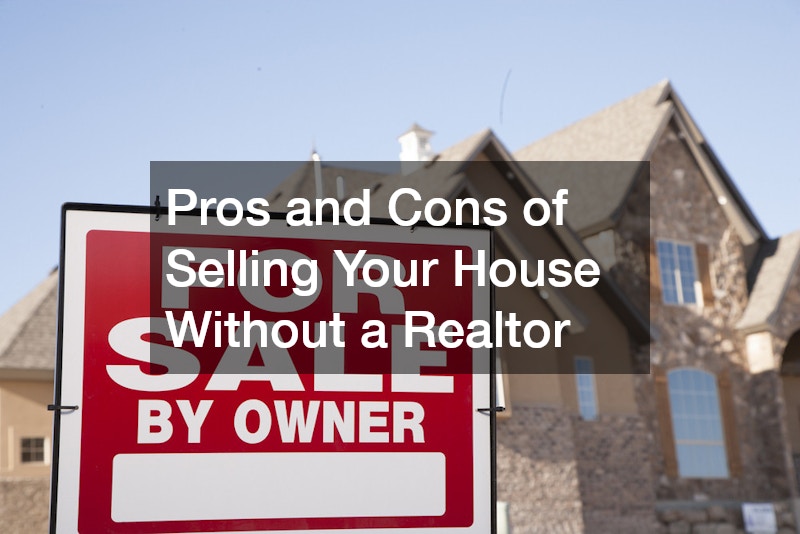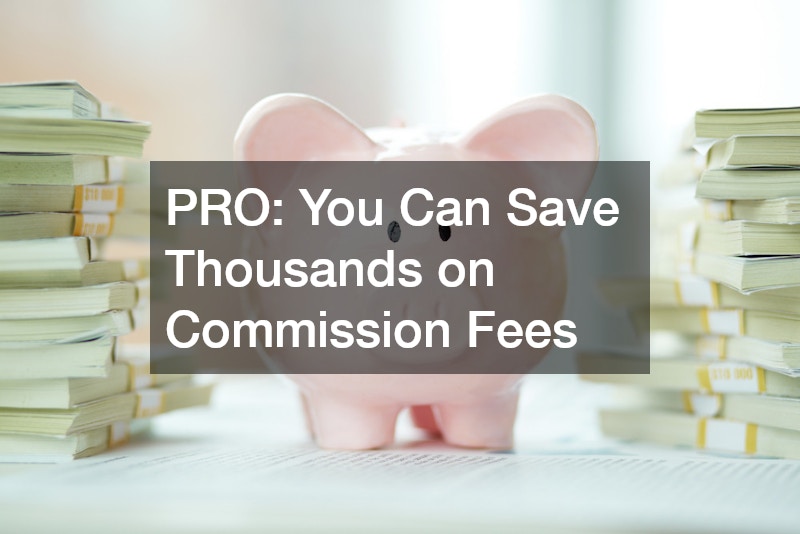Disclaimer: The financial content on this site is for informational purposes only and should not be considered financial or investment advice. Please consult a licensed financial advisor before making any financial decisions.
For many homeowners, the idea of selling their house without a realtor is tempting. It sounds straightforward—list the property, find a buyer, and close the deal. But like any major financial decision, going the For Sale By Owner (FSBO) route has its advantages and drawbacks. With real estate commissions averaging 5-6%, the potential for savings is real. However, so are the responsibilities that come with marketing, negotiating, and closing the sale yourself.
This guide breaks down the pros and cons of selling your house without a realtor, helping homeowners weigh their options carefully. Whether you’re downsizing, relocating, or just curious about alternative methods, understanding what you’re taking on—and what you’re giving up—is crucial.
What Does Selling Without a Realtor Actually Involve?
Selling your home without a real estate agent means you’re assuming full control over the process. This includes pricing the home correctly, preparing and staging it for buyers, marketing it effectively, handling negotiations, and completing all legal paperwork. Homeowners who take this route are referred to as FSBO sellers.
It’s important to understand that while you may save on agent commissions, you’ll also need to be highly organized and prepared for the time investment. Selling a house is a multifaceted process that requires knowledge of market trends, buyer psychology, legal procedures, and strong communication skills.
You’ll also be responsible for screening potential buyers to determine if they’re financially qualified, scheduling showings, reviewing offers, and navigating the closing process. Without a professional to lean on, FSBO sellers must be confident in their ability to handle everything from marketing to legal compliance. If that sounds overwhelming, it’s worth considering whether the potential savings justify the added complexity.
PRO: You Can Save Thousands on Commission Fees
The most cited benefit of selling your house without a realtor is avoiding the commission fee, typically around 5–6% of the sale price. On a $400,000 home, that’s $20,000 to $24,000 saved.
Here’s how the cost savings break down:
- 3% typically goes to the buyer’s agent
- 2–3% goes to the listing (your) agent
By listing the home yourself, you could cut your overall commission by half—or more—if the buyer isn’t represented by an agent either.
Key Tip: Even if you sell on your own, many FSBO sellers still offer a commission to the buyer’s agent to attract more interest.
These savings can be redirected toward your next home purchase, home improvements, or simply kept in your pocket. However, it’s important to weigh these potential savings against the time, energy, and resources you’ll need to successfully close the deal on your own. Cutting out the middleman has its benefits—but also its price in other forms.
CON: You May Struggle with Pricing Your Home Accurately
Realtors use tools like Comparative Market Analysis (CMA) reports and deep knowledge of the local market to price homes accurately. Without those tools or experience, FSBO sellers often overprice (scaring off buyers) or underprice (losing money).
Incorrect pricing can lead to:
- Your home sitting on the market for too long
- Multiple price reductions (which may signal desperation)
- Fewer showings and offers
Even if you save on commission, poor pricing can end up costing you far more in the long run.
Solution: Consider hiring a real estate appraiser to help you set a realistic price upfront.
Keep in mind that pricing too high can deter buyers entirely, while pricing too low might invite lowball offers or attract bargain hunters. Proper pricing is key to generating interest quickly and maximizing your home’s final sale price. Local knowledge, recent comparable sales, and seasonal market trends all play a role in determining the right asking price.
PRO: You Have Complete Control Over the Sale
Another key benefit of selling your home without a realtor is full control. From the asking price to the showing schedule, every decision is in your hands.
Advantages include:
- Choosing how to market your property (online listings, social media, flyers)
- Scheduling showings based on your availability
- Negotiating directly with buyers, which some people prefer
- Making decisions without agent influence
This freedom can be especially appealing to homeowners who are confident, experienced in sales, or working with a buyer they already know.
You can tailor your marketing to appeal to your ideal buyer and showcase your home in a way that reflects its personality. Some sellers appreciate the personal touch of connecting with buyers directly, which can lead to smoother negotiations and more transparent communication. If you’re strategic and self-motivated, this hands-on approach can be both efficient and rewarding.
CON: It Takes a Lot of Time and Effort
Selling a home is a full-time job, especially if you’re going it alone. Homeowners must wear many hats—marketer, sales agent, legal expert, and negotiator—all while handling their normal responsibilities.
Tasks include:
- Taking high-quality photos
- Writing listing descriptions
- Responding to inquiries
- Hosting open houses or private showings
- Reviewing offers and negotiating terms
- Managing inspections and paperwork
For many homeowners, this workload is overwhelming, particularly if they’re also moving, working, or managing family responsibilities.
Additionally, being constantly available for showings, managing follow-ups, and ensuring that paperwork is properly completed can quickly eat up your time and energy. The mental load can be significant, especially if problems arise during inspections or negotiations. If you don’t have a flexible schedule or support system in place, the demands of FSBO may outweigh its benefits.
PRO: You Know Your Home Best
As the homeowner, no one knows your property better than you do. When showing the house to potential buyers, you can provide personal insights that agents may overlook.
You can highlight:
- Unique features of your home
- Energy-efficient upgrades or renovations
- The benefits of your neighborhood or school district
- Nearby amenities like parks or shops
This personal touch can make a big difference, especially for buyers who are looking for more than just square footage—they want a story, a lifestyle, and a connection.
Buyers may feel more comfortable asking questions, and your genuine enthusiasm for the home can help them envision living there. This emotional connection can be powerful in driving interest and offers. However, it’s important to balance this passion with professionalism and avoid oversharing personal details that might be off-putting or irrelevant.
CON: Limited Exposure Without MLS Access
One major disadvantage of selling without a realtor is limited exposure to potential buyers. Real estate agents list homes on the Multiple Listing Service (MLS), which feeds into websites like Zillow, Redfin, and Realtor.com.
As an FSBO seller, your listing may:
- Not appear on high-traffic platforms
- Miss out on serious buyers working with agents
- Receive fewer showings overall
Workaround: You can pay a flat fee to list your property on the MLS through a third-party service. While not free, it boosts visibility and levels the playing field somewhat.
Without MLS access, your marketing reach will be largely limited to free platforms like Facebook Marketplace or Craigslist, which tend to attract casual browsers rather than committed buyers. If you’re not using professional photography and targeted ads, you risk losing credibility in a competitive market. Exposure is key, especially if you want to attract multiple offers or sell quickly.
Selling Your House Without a Realtor: What Are the Legal Risks?
One often overlooked aspect of selling your home without professional help is navigating the legal side of the transaction. Home sales involve legally binding contracts, disclosure forms, and negotiations around contingencies, financing, and inspections.
Without proper legal support, homeowners may:
- Inadvertently omit required disclosures
- Miss critical deadlines
- Fail to negotiate repairs or credits effectively
- Leave themselves vulnerable to lawsuits
To reduce risk:
- Consider hiring a real estate attorney
- Use state-approved FSBO contracts and disclosure forms
- Stay informed on fair housing laws and buyer rights
Having a legal expert can help protect your interests, even if you decide to forego a realtor.
Legal missteps can delay closing or even kill a deal entirely. Issues like title disputes, boundary discrepancies, and contract loopholes can lead to costly legal battles down the road. This is especially true in states with complex disclosure laws. Consulting with a real estate attorney is a small investment that can provide peace of mind throughout the transaction.
PRO: It Can Be a Smart Choice in Hot Markets
In a seller’s market, where demand is high and inventory is low, selling your house without a realtor becomes easier. Buyers are more aggressive, and homes often sell quickly, sometimes above asking price.
Signs it might be a good time to go FSBO:
- Homes in your area are selling within days
- You’ve received interest before even listing
- You already have a qualified buyer lined up (e.g., family, friend, or neighbor)
In these situations, you may find a realtor’s services less necessary, especially if you’re confident in your pricing and negotiation skills.
Hot markets give sellers the leverage to dictate terms, minimize contingencies, and skip formal marketing channels altogether. You might be able to close a deal faster and with less hassle. However, even in a strong market, being informed and prepared is crucial to avoid costly mistakes.
CON: You Might Net Less Even After Saving on Commission
Ironically, even though you can save money on agent fees, the prices of FSBO homes are often lower than agent-assisted homes. According to a 2023 report by the National Association of Realtors, FSBO homes sold at a median of $120,000 less than agent-assisted homes.
Why the difference?
- Lower visibility and marketing
- Inexperience in negotiations
- Missed pricing opportunities
- Reduced buyer confidence (some buyers trust agent-listed homes more)
So while you avoid commission, the final net profit may still be lower.
If maximizing your sale price is your primary goal, hiring a realtor might yield better results in the end. Their network, negotiation experience, and access to marketing tools can increase your home’s perceived value. It’s a classic case of penny-wise, pound-foolish if your DIY approach costs you more than it saves.
Bonus Tip: Don’t Forget About the Rest—Staging, Cleaning, and Curb Appeal
Realtors often guide homeowners on how to present their homes in the best light. Without that guidance, FSBO sellers must take the lead on presentation. Don’t overlook these elements:
- Deep cleaning every surface, including carpets and windows
- Staging to highlight the best features of each room
- Professional photography to make your listing stand out
- Curb appeal upgrades like mowing the lawn or painting the front door
Buyers form an opinion within seconds—first impressions matter.
Presentation plays a critical role in how quickly your home sells and for how much. According to the National Association of Realtors, staged homes tend to sell faster and for higher prices. Consider hiring a staging consultant or browsing online for staging ideas. It’s one of the most cost-effective steps you can take to boost your home’s appeal.
Final Thought: Is Selling Without a Realtor Right for You?
The decision to sell your house without a realtor depends on your goals, comfort level, and available time. If you’re highly motivated, organized, and in a hot market, the FSBO route may work in your favor. But if you’re short on time or unsure about legal and pricing details, working with a professional could ultimately save you stress—and potentially money.
Either way, it’s crucial to do your homework. Take advantage of online resources, speak with professionals when needed, and weigh the real costs—both financial and emotional—before you choose your path. Whether you’re navigating paperwork or deciding how to market your home, knowing what to expect can help you make smarter choices and feel more confident in the process.


